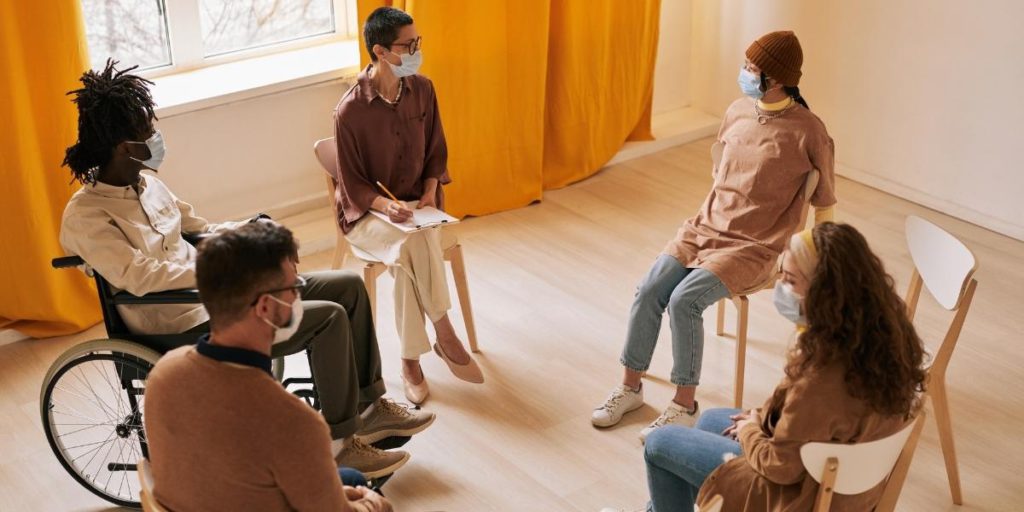What Is Residential Treatment?
Drug and Alcohol Treatment

Commonly used as a direct intervention for people battling substance abuse and mental disorders, residential treatment provides safe housing and around-the-clock medical care in a recovery environment.
What Is Residential Treatment?
Residential treatment is the first step for people struggling with addiction or co-existing mental and substance use disorders who need comprehensive, structured care.
It’s a form of treatment with licensed, residentially based living arrangements, from small group homes to large facilities.
Residential treatment’s purpose is to help people struggling with addiction and psychological difficulties become stable in their recovery before moving into an outpatient program and an unsupervised environment.
It also allows residents to feel empowered during treatment and take control of their healing by providing structure, routine, and boundaries.
A residential treatment program offers 24-hour care that focuses on intensive recovery and is often the beginning of the recovery process. Continuing care, such as a partial-hospitalization program (PHP) or another type of outpatient program after a patient leaves a residential treatment center, is the best way to ensure success for a lasting recovery.
Facilities offering residential treatment programs aim to continue the patient’s recovery by transitioning to outpatient care with a prepared treatment plan of continued medication and frequent therapy.
Care at a residential treatment facility includes:
- Intensive 24-hour care
- Medical detox with 24-hour nursing care (if needed)
- Frequent individual and group therapy sessions
- Family therapy
- Professional and social support
- Psychiatric help
- Structure and routine
- Nutrition and wellness education
Residential treatment and its integrated therapies have been widely studied and have become the standard treatment for people with complicated and severe substance use problems.
When using evidence-based treatment therapies, mental disorders such as anxiety or depression can sometimes be found at the core of a substance use disorder. It is essential to address these co-occurring issues at the same time. This approach is called dual diagnosis, in which both the addiction and the emotional or behavioral condition get treated simultaneously.

Drug and Alcohol Treatment
Residential treatment can be more effective for drug and alcohol treatment than detox and outpatient treatment programs.
The facilities provide people recovering from substance abuse stability, routine, as well as time and space away from triggering events, places, or people.
The Substance Abuse and Mental Health Services Administration (SAMHSA) explains residential treatment for substance use disorders as a direct service with several components used to evaluate, diagnose, and treat the symptoms associated with addiction. The intensity of the inpatient treatment is dependent on the resident’s needs.
Who Is Residential Treatment For?
Residential treatment is appropriate for people with co-occurring substance use disorders and mental conditions because the challenges accompanying multiple disorders need intensive treatment in a safe environment.
It can benefit anyone seeking relief from addiction, associated eating disorders, behavioral problems, and mood or personality disorders. The programs offered by residential treatment centers cover a wide range of mental health conditions, either caused by addiction or abusing substances to self-medicate.
Benefits of Residential Treatment
The benefits of residential treatment can have long-lasting effects on an individual’s overall behavioral health by providing them a key steppingstone to lower levels of care.
The structure and routines provided in a residential treatment program are essential foundations for those healing from substance abuse to build and maintain.
With licensed staff to help support patients throughout their stay and evidence-based therapies and approaches to care, residential treatment can serve as a step towards normalcy after a crisis or relapse event.
Ultimately, it helps people feel empowered and prepared to move forward in their recovery.

Residential Treatment Facility in Los Angeles
Admitting that you need help and enrolling yourself into a residential treatment center is overwhelming and stressful, but it can be the best decision of your life.
Our residential treatment program at Northridge Addiction Treatment Center is the ideal sanctuary for profound healing.
NATC‘s small six-person residential facility in Los Angeles is a family environment to heal comfortably among people who share similar difficulties— removing any guilt and giving you confidence that lifelong recovery is achievable.
Our licensed and professional staff have an abundance of medical and life experience. It removes the shame in recovery, knowing some of our staff members have been through their own recovery transformations.
Addiction is a disease, but it is manageable. At NATC, we ensure to tailor your recovery plan to meet all your needs while you’re in our care and after you walk out of our doors. We utilize only effective, evidence-based treatments to give you the foundation to return to your old environment and have the skills to cope and know what to do.
Our treatment specialists are compassionate and eager to assist you in finding help. Reach out now to find your path to recovery. Relief from addiction may start with just a phone call.
Find Meaningful Recovery
Our caring and compassionate specialists are eager to help you comfortably navigate this journey to recovery. Our individualized treatment plan, programs, and therapies may be a perfect match for you or your loved one. Let us assist you in living the happy life you deserve. It starts with a phone call.




